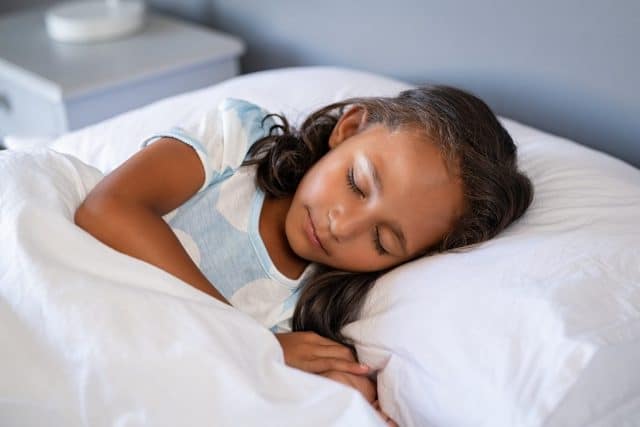16 March 2022 – Sleep problems are a well-known issue for autistic children.
Some studies even estimate that between 60 – 80% of autistic children have sleep disturbance issues (Malow, Katz, & Reynolds, 2016). This commonly manifests in bedtime resistance, taking much longer to fall asleep, trouble staying asleep and waking frequently in the night due to tossing, turning, and kicking. This restlessness has been attributed to a behavioural symptom of autism for a long time, but one study is challenging that idea.
A 2020 study by Kanney, Durmer, Trotti, & Leu suggests that some of the sleep problems that autistic children exhibit may stem from an underlying condition called Restless Leg Syndrome.
Restless Leg Syndrome is a neurological sensory disorder that can be explained as feeling a very unpleasant sensation in your legs, which can be temporarily relieved by moving them. These symptoms tend to get worse at night, particularly during bedtime when trying to sleep.
The syndrome is not specific to autism; it is estimated to affect between 7% to 10% of the general population. It is not known what causes it in most cases, however iron deficiency has been established as a risk factor. In New Zealand, it is estimated that 1.6% of children have iron deficiencies (Ministry of Health, 2003). It has also been theorised that autistic children could be more vulnerable to iron deficiencies due to restrictive dietary preferences (Herguner, Kelesoglu, Tanidir, & Copur, 2012).
It may also be underdiagnosed in autistic children, not just because it gets lumped in with autistic behavioural symptoms, but also because young autistic children or children with communication issues can have trouble talking about and explaining the uncomfortable feeling in their legs as the reason for their restlessness.
Kanney et al., (2020) examined the medical charts of 103 autistic children with chronic insomnia who underwent clinical assessments at a sleep clinic over a three-year period. Each child participated in an overnight sleep study and a test of their iron levels. Forty-one of these children (39%) were found to have Restless Leg Syndrome, which was associated with a significantly lower count of serum ferritin (iron). 25 patients undertook oral iron therapy (iron supplements) over an eight-week period, and 23 of these children showed improvement in restless sleep during the clinic follow up. Only one patient experienced negative symptoms (nausea and vomiting), before discontinuing the treatment.
Patients who did not report improvement after iron treatment, and patients who had normal iron (ferritin) levels, were offered treatment with the anticonvulsant gabapentin. There were no serious side effects reported in this study, and all 15 patients who trialled gabapentin reported improved sleep quality.
This, of course, is just one study, and the study itself had limitations such as the lack of a control group, ferritin data missing for some patients, and the retrospective design of the study. There need to be more studies conducted to determine the prevalence of Restless Leg Syndrome amongst autistic children, as well as how effective iron supplementation is at treating this issue.
That said, if your child is having persistent sleep problems, or you have noticed agitated moving when your child is sleeping or trying to sleep, it may be worthwhile asking your paediatrician about the possibility of Restless Leg Syndrome as it is something that is potentially treatable.
References
Herguner, S., Kelesoglu, F. M., Tanidir, C., & Copur, M. (2012). Ferritin and iron levels in children with autistic disorders. Eur J Pediatr, 171(1), 143-146.
Kanney, M. L., Durmer, J. S., Trotti, L. M., & Leu, R. (2020). Rethinking bedtime resistance in children with autism: is restless legs syndrome to blame? Journal of Clinical Sleep Medicine.
Malow, B. A., Katz, T., Reynolds, A. M., et al. (2016). Sleep difficulties and medications in children with autism spectrum disorders: A registry study. Paediatrics, 137, 98-104.
Ministry of Health. (2003). NZ Food NZ Children: key results of the 2002 National Children’s Nutrition Survey. Wellington, New Zealand.
Author
Ashe Yee



